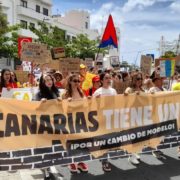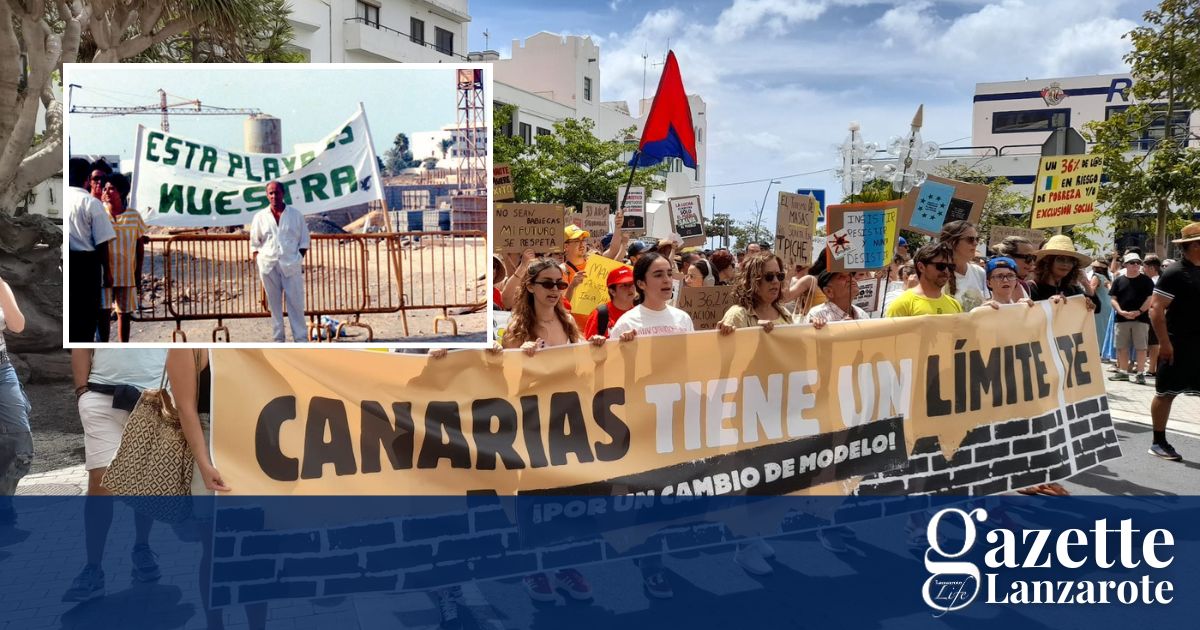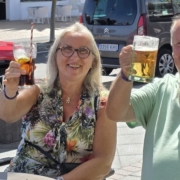Last month’s demonstrations against mass tourism development on the Canary Islands made international headlines. However, many of those headlines failed to represent the real reasons behind the protests, which were not aimed at tourists or well-managed tourism. We look at the real issues behind the marches.
Last spring, the then-Cabildo president Maria Dolores Corujo declared Lanzarote was “saturated” after a travel fair. This was uncontroversial at the time, but when the UK press started to report her statements, falsely claiming that “Lanzarote doesn’t want tourists”, local opposition politicians saw an opportunity to capitalise before the May elections, accusing her of damaging the island’s image and threatening its main source of income.
Now those opponents are in charge of the Cabildo and are themselves having to deal with a widespread consensus among islanders that the island is too full, and that successive governments of all parties have failed to prepare for the record numbers of tourists that have been arriving since the Covid pandemic ended.
The demonstrations of April 20 reflected that consensus. They were not aimed at tourists, but at the authorities who have allowed Lanzarote to reach a level of tourist development that many feel is unsustainable.
Mounting Problems
The increase in tourism, and changes in the way people behave when they’re visiting the island, have contributed to increasing pressure on an inadequate public transport system and consistently long queues at some of the island’s favourite tourist attractions. Meanwhile, last summer’s combination of sweltering heat and record tourist numbers caused water shortages in many parts of the island.
However, the main complaint is housing. On Lanzarote, it is now virtually impossible to find reasonably priced long-term rental accommodation, while house prices continue to rise well out of reach of most locals.
Tourism is partly to blame for this, as many property owners prefer to take advantage of the lucrative holiday rental market rather than rent to tenants whose legal rights can make them difficult to remove. In recent years, the Airbnb boom means it’s become common to see tourists in areas such as Arrecife and Playa Honda, where they were hardly known ten years ago.
The results include families permanently living in mobile homes or deciding to leave the island; businesses that are unable to open because staff cannot find anywhere to live; professionals such as doctors, nurses, policemen and other public workers refusing to come to an island where decently priced accommodation is unavailable. There is plenty of work, but wages remain far too low to compensate for rents.
This is not just a Lanzarote problem. It exists in many tourist destinations all over Europe. Elsewhere in Spain, it has resulted in sticker campaigns telling tourists to stay away and laws prohibiting the sale of properties to non-residents.
All this resulted in the calling of a demonstration against the effects of mass tourism on all eight Canary Islands on 20th April. Organisers have been keen to stress that this was not a campaign against tourists and recognise that the islands rely on tourism for most of their income. Instead, the protest was aimed at authorities who appear to keep approving new hotels and swanning off to sign agreements at travel fairs without preparing the island for the results of an ever-increasing influx of visitors.
A long history of opposition
On Lanzarote, there has always been opposition to overdevelopment of the island. In 1985, César Manrique – whose works helped convert the island into a popular tourist destination – wrote “It’s time to stop.” Manrique was an active participant in large demonstrations against the building of new hotels, which resulted in the 1991 Development Plan.

Before that plan was drawn up, there were staggering proposals for more than 300,000 tourist beds on Lanzarote. The plan limited that to 110,000, and restricted tourist development to a few strictly defined resort areas, avoiding the sprawl that has affected so many other Spanish resorts.
The César Manrique Foundation, which protects the legacy of Manrique, openly supported the April 20th protests, saying “Lanzarote has limits, which have been surpassed for a long time. The negative consequences invade our daily lives.”
Media madness
After the April demos were announced, British papers such as the Mirror and the Star printed “warnings” to tourists, although absolutely no official warnings have been issued.
This was nothing new. Every time there is talk of limiting tourism on the Canaries, elements of the British press falsely claim that “tourists are not wanted” and may even discuss boycotting the islands, as recently happened on an episode of Good Morning Britain. Articles online will reliably see several keyboard warriors vowing to take their custom elsewhere.
But while many locals worry about the damage to image of the islands such headlines cause, there is no evidence that they have any effect on tourist numbers. Indeed, last spring’s storm about “saturation” was followed by several months of record visitor numbers.











Leave a Reply
Want to join the discussion?Feel free to contribute!